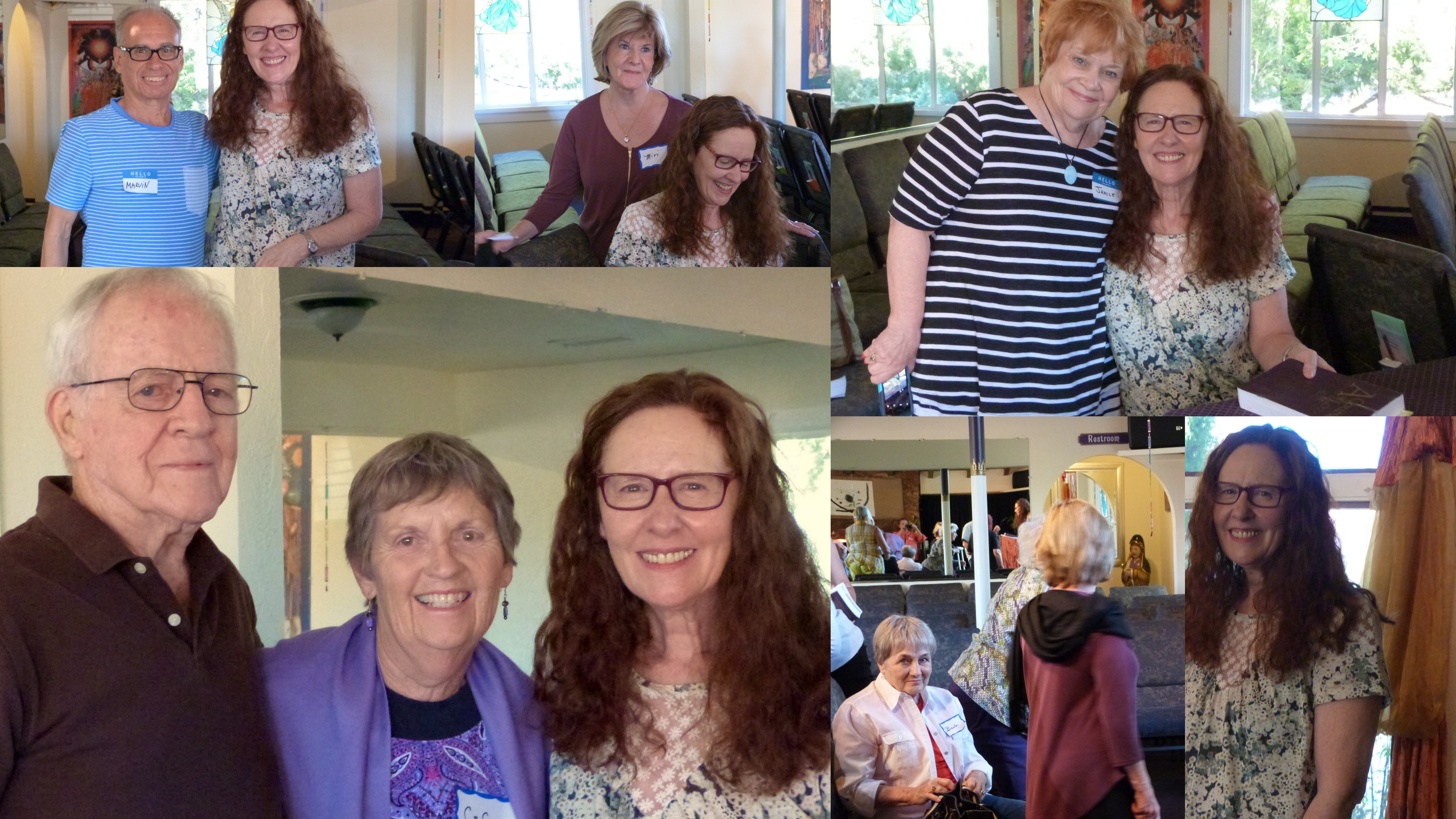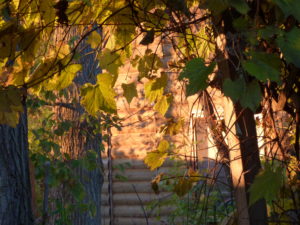Mari’s Blog
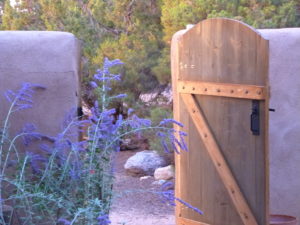
The cause and effect of love joining the world
Take all the images of love set apart that you have made and extend them outside love’s doors. What difference would a world of love make to those who lock their doors upon the world? How vast the reaches where their world of love could extend once love joined the world. How little need for the angry ones to retain their anger when love has joined the world. For love does join the world, and it is within this joining that love abides, holy as itself. C: 4.25
…[I]ssues, when removed from feelings, still remain issues. They remain social causes, environmental causes, political causes. The cause of all these issues is fear. The cause and effect of love is all that will replace these causes of fear with the means and end that will transform them along with you. You are means and end. It is within your power to be saviors of the world. It is from within that your power will save the world. D:Day10.37
I began my time at my cabin window wondering why I am not heartbroken over events of the 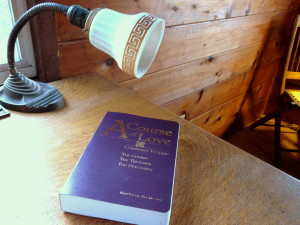 past week, the election that named our new president of the United States.
past week, the election that named our new president of the United States.
The election of 2008 came to mind and I knew that if Barack Obama had lost that election, heartbreak is what I would have felt. Obama gave me hope. And so I concluded that it would have taken hope in one of our 2016 candidates to cause me to feel heartbreak in ones defeat.
Our collective disenchantment with the establishment, or “the old” is perhaps what this election came to reveal. I heard one commentator say that if the democrats had realized the extent of the public’s disenchantment they would have supported Bernie Sanders over Hillary Clinton.
Now they know.
Yet this was not enough solace and I was in need of Jesus and his messages of love. Yet what I was reminded of as I went to A Course of Love, was a statement that has been challenged a time or two:
You do not yet believe nor understand that the urges that you feel are real, and neither good nor bad. Your feelings in truth come from love, your response to them is what is guided by fear. Even feelings of destruction and violence come from love. You are not bad, and you have no feelings that can be labeled so. Yet you are misguided concerning what your feelings mean and how they would bring love to you and you to love. C: 5.11
The key to understanding this passage is about response. Is your response to what you feel guided by fear, or by love?
Our feelings are of love—but they are distorted by fear. Who hasn’t experienced this distortion? Who among us is not able to recognize it when we see it displayed?
To see that all of our feelings are of love, we’re asked to enter into a relationship with each and suspend our judgment of all.
And so we return to this in The Dialogues Day 10: Power, hearing again, in vs. 31-34 about these feelings:
If you are being called to acknowledge these feelings, what are you being called to do with them? You are being called to respond to them with acceptance and love. As a man, I took a stand for the powerless and called them to power. I am still doing so. Not because any of you are powerless but because you do not know your power. If there is one thing associated with my life more so than any other, it was this. I was an advocate for all to know their power. Do you think that my advocacy was a social statement for the times in which I lived? Or do you not see that it is the same now as then? 10.31
All the issues that those you would call spiritual leaders are called to champion or censor have their roots in timeless and universal spiritual truths. It is the timeless and universal that you are called, in unity, to respond to and with. But this response will not be generated without the feelings that precede them! … When speaking of the many issues facing your world in this time, we are speaking of situations that would seem to be extreme and to call for extreme measures. The only extreme measure called for now is the same extreme measure that I called for during my life. It is the call to embrace your power. 10.32
My dear brothers and sisters in Christ, turn your thoughts not to ideals of social activism, to causes, or to championing any one side over another. Turn not to your thoughts but to your feelings and go where they lead. And everywhere they lead you, remember one thing only. Remember to embrace your power. The power of love is the cause and effect that will change the world by returning you, and all your brothers and sisters, to who they are in truth. This cannot be done from without but must be done from within. It is the transformation that is caused within that will affect the world without. 10.33
The power you must come to rely upon is the power of your own Self to create and express the cause and effect that is the power of love. 10.34
Some have seen verse 10.33 as a call against social activism. I do not see it that way. Some may find their hearts calling them to do just that. Some won’t. Each of us only need to be concerned with responding to our own heart’s call with love. When we respond with love rather than fear, we will stay united with the Cause of Love and work always toward unity.
Jesus concludes in this way:
Although I need no awareness of the issues facing your time in order to speak to you of such things, I am aware of them. So is every other living thing because all that lives exists in relationship. What I have often referred to as the urgency of this time has been partially because of these issues and partially because of your readiness. It is no accident that these two aspects of urgency are converging. When your reliance on all that exists apart from your Self—your reliance on science and technology and medicine and military might—has been shown to be unfounded, a new source of reliable power is finally sought with the tenacity with which these other sources of seeming power have been sought. This is what has occurred. This is the time at which we stand. 10.35
All of the solutions to the issues facing the world and those who live upon it have been pursued separately from one another and from God— until recently. Now unity is being sought and unity is being found. 10.36
You are means and end.
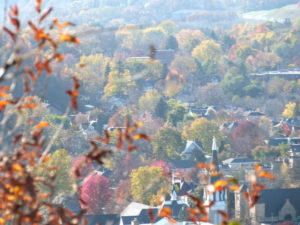
Love’s freedom (from the ego)
 Who you are is love, and all things brought to love are seen in a new light, a light that keeps what you would learn to help you remember who you are, and in that remembrance transforms the rest, leaving you with nothing to be ashamed of, nothing to keep hidden, leaving you with nothing but the truth of who you are. C:31.20
Who you are is love, and all things brought to love are seen in a new light, a light that keeps what you would learn to help you remember who you are, and in that remembrance transforms the rest, leaving you with nothing to be ashamed of, nothing to keep hidden, leaving you with nothing but the truth of who you are. C:31.20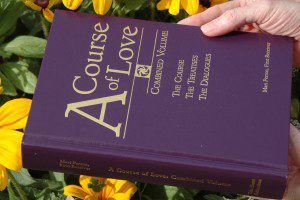
Your remembrance of the Christ-Self has abolished the ego-self and allows us to begin the lessons of the personal self. T3:1.13
Our freedom comes in release of the burden of not being who we are, the burden of the dictator ego, the declaration of our independence from it, or even better, our acceptance that it does not now and never did exist in truth.
While spending the day with ACOL reader/receivers in Sedona I felt a desire to face the belief in (or continuing acceptance of the existence of) the ego head on. I have spoken of this before, but never in a way of, “Let’s look at this.” In my preamble to the topic I spoke of meeting so many truly loving people who’ve read ACOL many times, and still speak of “their” ego—and so the suggestion—“Let’s talk about it.”
My challenge came in a way I didn’t expect—in a quite thoughtful suggestion that the ego can be befriended. I don’t remember word-for-word what I said in response, but it was the closest I know of to any statement I’ve made that might be considered dogmatic. I said something along the lines of this being an understandable idea psychologically, but that with the definition of ego given us in ACOL and the action we’re asked to take, this is not the call.
“According to A Course of Love.” Yikes!
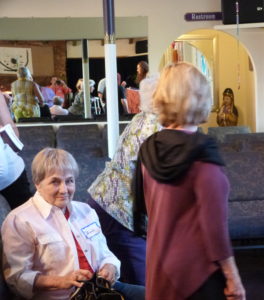
I’ve gone a long time without saying, “According to A Course of Love.” According to A Course of Love/according to Jesus … this is the way … that is not the way. Surely, any way we loosen the ego’s hold on us is valuable. I could have said that. But I didn’t.
It was just after lunch when I suggested opening this conversation. We’d had the most lovely morning, but now it was afternoon.
I looked out at people in their “after lunch” slump, the bright enthusiasm of the morning dimmed, and probably in part due to my own discomfort in having said, “According to A Course of Love,” I moved us on and away from the whole subject before too long. A woman asked me a question about it later that I said I’d respond to by email. The question was, “How do I get rid of the ego?”
What an amazing thing that I had never been asked this question before. And that I had no idea how to answer it. I don’t know that I ever even thought of it in those terms. It had always felt to me that with the embrace of love and acceptance of truth, the letting go happened of its own. I have spoken of it mainly because I’ve felt that people judge their feelings and the thoughts that they deem negative as “ego,” and so the idea remains that until a certain perfection is reached, the ego is still part of their identity. I am really very good at encouraging acceptance of all feelings as feelings of love as we proceed, through The Dialogues, and our dialogues, as egoless selves. But the question of ego remains.
I could cite all kinds of quotes from ACOL on the topic, some that could be read as arguments against the ego, many that are appeals to accept the truth, few or none that specifically state a “how to” even while the whole of it offers many ways to acceptance. I found my acceptance in the felt experience of love and the uniting of mind and heart—the coming of wholeheartedness. When the heart and mind come together, judging and comparing one self (ego self) to the other (true Self), a “right self” to a “wrong self” begins to meet its end. These judgments that were carried so easily from ourselves to situations and relationships, quiet down. As within/so without.
In finding this unity within, the “righting” of all that prevented us from being who we truly are begins. These things are often challenging and even conflict inducing. Feelings of anger or sadness, grief or depression may arise…feelings needing room to be felt, expressed and healed. There may be calls to Self-empowerment seen as self-defense. Emergent Self-love might be seen as thinking too highly of oneself or being selfish. There may be much confusion about all this at first. How can I feel this way? Yet it is love (not ego) that lets us turn confusion into clarity. We are “already there” and being held in the embrace that heals us into wholeness. 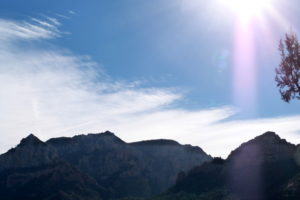
Who you are is love.
What happens first? An end to judgment? Or the advent of self-love? See what I mean? It’s all about love. In accepting love, the heart’s patterns begin to take the lead and you and I begin to see who we truly are. That is it really, the end of the ego. Yes, we’re told that some of the patterns “of the ego’s thought system” may remain for a while, but not “the ego” which is likened (in C:9.31 ) to “an imaginary friend.” Friend or foe, the ego is not real. It’s not “who” we are, and ceasing to identify with it is the way it meets its end, and is the end of having two selves. As much as love is crucial, the end of a “two-self” idea is crucial as well. The “first unity” is unity within. The “first unity” allows the acceptance of all that is and all that is yet to come, and the rejection of all that never was and never will be.
In this current election period, (as much as I hate to mention it) we’ve been seeing a crystal-clear demonstration of what happens when there are two sides doing battle. Love’s call is a call to no more battles. Love’s call is a call of unity. It won’t be seen “out there” until it is seen and accepted “in here.”
Each of you has had an imprisoned personal self. Each of you who have entered Christ-consciousness has had the cell door and the prison gate thrown open and a new world offered. If you do not “accept” this opportunity, you remain incarcerated in a system that tells you when you will awaken, how you will spend your day and when you will retire. You remain at the mercy of those who are incarcerated along with you. You remain at the mercy of those who would have power over you, and you remain subject to the laws of man. D4.5
Each of us can choose love’s freedom, the freedom of having one true Self, of living by the laws of Love, and of being able to be distinctly who we are within unity.

Response and injury
 The answer lies in your response to love. T1:2.3
The answer lies in your response to love. T1:2.3
Do I know where, along the path to the cabin, the tree roots protrude beneath the insubstantial but concealing cushion of leaves? Do I have enough muscle memory to avoid the dips and rises? I sit down at the cabin window and pull a plain but lovely twig of the grapevine from my hair. It’s my first time out in a few days. I came without my cast. The first time I tried walking out in the cast, and had the cast’s hard surface meet the uneven and ungiving firmness of the now compacted and cooling down floor of the woods, (not to mention roots and newly fallen limbs), I knew it wasn’t going to work and I stayed in, sitting in the sunroom (with my feet up) looking out. Oh man, the metaphors I could draw from this failure to rest an injured part, to be willing to do just about anything but.
I took a fall in August, found my ankle swollen that night and the next, but not being in any pain or even much discomfort, I carried on as usual. Long story short, it took months without healing and my then upcoming trip to Sedona to cause me to revisit it, get an x-ray, and discover a fracture. I was sent home and went to Sedona in my boot cast, but didn’t exactly stay off my foot.
Returning from Sedona, I embarked on my annual adventure with my daughters and  their families, enjoying the fall leaves in the small river town of Red Wing. All the walking that we did there put me over the proverbial edge that an injured person sometimes must fall over before they respect their injury. I thought the cast was enough in itself. It wasn’t.
their families, enjoying the fall leaves in the small river town of Red Wing. All the walking that we did there put me over the proverbial edge that an injured person sometimes must fall over before they respect their injury. I thought the cast was enough in itself. It wasn’t.
So now I’m resting. Last night I became gleeful with the rest and a love for my life. I was home from my ACOL travels, home from visiting my mom, Henry had gone back home after his day here, and I was wandering from kitchen to living room when it happened. Donny had made baked kibbee and I made it into a sandwich with cream cheese, mint and flatbread, and then went back and made another, and still left the mess out, not yet being sure if I might return for still another. There between kitchen and living room I realized how happy I was. Then I returned to my seat near the TV, raised my feet onto a stool, and variably watched, read a magazine, and browsed a new book that had just arrived in the mail.
It is at least a little akin to the wandering that I do out here, a meandering sort of existence for which I always enjoy finding support.
Without the trip to Red Wing, I might not have found the support for such a life offered by an unlikely source: a composer. As I sat, reading the morning paper in the lobby/breakfast area of the hotel, drinking coffee and eating cinnamon raisin toast, I found a kindred spirit who helped me attend to my joy—not only in resting—but in being the way I am.
The article starts out this way: “When events overwhelm composer Jake Runestad he responds the only way he knows how: with music.” An upcoming performance is described as an “evening of beauty and loss.” Right there I was hooked, because the best word I’ve found to describe the experience that began with receiving ACOL has been feeling overwhelmed, and one of its major themes has been the adjustment it is to hold opposites in harmony, or even to hold them at all, to keep them connected.
One of the events Jake responded to was the police shooting of Philando Castile, a black man who worked in a school cafeteria here in St. Paul and was loved by those best qualified to see goodness: the children. Jake spoke first of being “a middle-class white male, an artist” and of struggling with the idea of privilege “in ways I can’t necessarily help.” Then he said he attended the memorial wanting to show support and be there “but also trying to figure out what role I could have. I don’t want to trivialize anyone or anything, so I decided the best way I can respond is through my art, to try to foster compassion and bring beauty into the world.” His event this weekend is to honor those lost to gun violence. (You can listen to some of his music here: (http://jakerunestad.com/)
Jake says his art is a way of discovering, of trying to understand or question something. That is what my “art” is to me too.
In order to make a living, Runestad travels three or four times a month to meet with people (I assume other composers, or budding composers). “These are people I’ve never met in my entire life. I arrive to work with them and it’s like, suddenly, we know each other because we connect through music. I’ve never felt that with anything else before.”
Jake arrives at his meetings. I arrive at my Course of Love events where I, too, meet people I’ve never met before, people who are responding the only way they know how. And it’s like we know each other, we connect through A Course of Love.
And some of it has to do with injuries. . . and our holding of them. Holding world events of pain in the embrace of the love that is also going on. Holding the major injury experienced in not being who we are alongside the major healing into wholeness going on. Holding activity in the embrace of rest. Holding injuries of the closed heart together with the new feelings of the open heart. You and I can feel hurt, weakened, or wrong—but it is in a new response that we discover the injury’s gift, and begin our recovery.
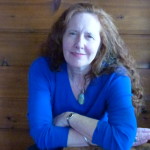 We are, in that old saying, “on the mend.” We are also in movement. In our responses of love to love, you and I find beauty and compassion and the desire to create that which will heal, inspire, and bring new inner and outer worlds into being.
We are, in that old saying, “on the mend.” We are also in movement. In our responses of love to love, you and I find beauty and compassion and the desire to create that which will heal, inspire, and bring new inner and outer worlds into being.
In activity and in rest, we are carried on! And along the way, we come to express the truth of who we are.
From A Treatise on the Art of Thought:
The truth is the truth and not dependent upon your definition of it. A response is not an interpretation. A response is an expression of who you are rather than of what you believe something else to be. T1:4.18
St. Paul Pioneer Press, “Young composer seeks harmony in social justice questions.” Chris Hewitt. C1 & 10.
The slow reveal and palpable awareness
 Start with this idea: You will allow for the possibility of a new truth to be revealed to your waiting heart. Hold in your heart the idea that as you read these words—and when you finish reading these words— their truth will be revealed to you. Let your heart be open to a new kind of evidence of what constitutes the truth. (C:7.23)
Start with this idea: You will allow for the possibility of a new truth to be revealed to your waiting heart. Hold in your heart the idea that as you read these words—and when you finish reading these words— their truth will be revealed to you. Let your heart be open to a new kind of evidence of what constitutes the truth. (C:7.23)
One early morning while in Sedona for my recent Course of Love gathering, I got up early and drove out of town and into the mountains. On the road, “the reveal” is both quick and slow.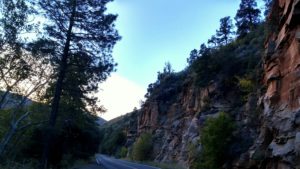
On the road, you’re going at a careful speed toward a curve. That moment of going “around” the curve passes in less than ten seconds, but the suspension of it! That feeling of being surprised. Of not knowing what you’ll find there.
You’re approaching the unknown.
The thrill it is to do that! The heightened senses that you’re aware of and unaware of at the same time because it’s a happening that you’re living. You’re not noticing what your body is going through and how it’s registering it all and applying just enough pressure to the gas pedal and just the right movement to the steering wheel. You don’t realize that you’ve ducked your head beneath the majesty.
And then during those expanses where you’re surrounded by rock and feel held in its embrace, and those where you see vistas and become aware of the LIFE! The LIVING majesty. The aliveness. The beingness of the land. I spoke to that aliveness and it spoke back. I honored it and it honored me. I felt it! Palpably. Whoever coined the phrase “palpable awareness?” Oh, I think the phrase is “palpable forgiveness,” and I can coin the phrase palpable awareness! The “palpable” part is such a good description of the feeling of it, the really “getting of it.”
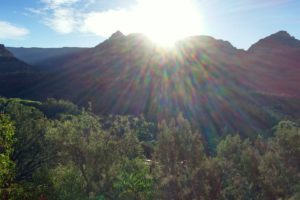 The radical newness of seeing you can “experience” when your inner or outer terrain changes! As our brother Jesus says, “the territory of our consciousness awareness” expands.
The radical newness of seeing you can “experience” when your inner or outer terrain changes! As our brother Jesus says, “the territory of our consciousness awareness” expands.
And the same is true of people. The slow reveal. And the same quality of the expansion as the revelation happens.
Palpable comes from the Latin palpabilis, palpare—to touch. It means: to make, move, shake, feel. Palpitate is said especially of heart action that one is conscious of: to throb, quiver, tremble.
What a gift has been given me. In addition to the driving, I had several opportunities to share ACOL in Sedona. There was the all-day Course of Love gathering at Unity of Sedona, there was a chance to join with a large group of ACOL readers at their regular weekly time, and I gave the “message” during the two Sunday services. The primary gift of Sedona, for me, was people falling in love with my voice, telling me that there was something “happening” when they listened as I read my beloved Jesus’ words . . . and my own. I wrote this piece on “Hidden Doors” for the “message.” I may write many pieces on doors! Oh, if I could write beautiful things and read them and have them loved!
Oh …. The gift I’ve discovered is that I can! This was the surprise.
It is a challenge to prepare myself to engage for a whole day with people at “events.” I so want to share this Course … and give value in the way that I do so. And yet I feel in my bones like a writer, and I cannot prepare for that in-depth, day-long sharing through writing, no matter how much I would like to. I prepare, but I cannot have a script.
This is beautiful! A beautiful challenge and a beautiful experience. It allows for the unexpected that comes in between my sharing of the experience and the message of A Course of Love, the readers sharing of theirs, and our responses to each other. This is what makes for the anticipation and discovery, the realness that is so welcome and so lovely. This has happened each time I have gathered with ACOL reader/receivers, and it happens in that unpredictable way that is the slow reveal.
Yet my own greatest reveal came of letting myself “write” the message and having it be received. My heart spoke, and my heart was held, and my heart palpitated. It was such a joy!
In The Dialogues, Chapter 8, Jesus says that when you accept that you have access to a “given” Self, to something neither earned nor worked hard to attain, you can then also imagine that this “given” Self existed prior to the time of learning. Our talents are one of the first things that alert us to the existence of our “givens.” As we concentrate on this idea of “givens,” we expand the territory of our conscious awareness and, at the same time, realize that this “given” (talent or ability) is quite wonderful.
When you have realized that you are “more” than your body, your natural talent or ability has been one of the primary factors leading to this realization. It has been one of the primary factors leading to this realization because a part of you has always known this ability was a “given.” That you are gifted—given to—and able to receive. And despite what science might have to say to you about the source of such talents or abilities, you have known that they are not of the body. (D:8.4)
How remarkable and how true. As we concentrate on the givens “in” us, we expand. We expand both within and without, increasing the territory of our conscious awareness. When you and I share our gifts, we combine what is beyond the body with the actions of our bodies. We meet as our “given” Selves.
My gratitude is boundless for all who share their given Selves with me. And for the chance to share my given Self! This is expansion!
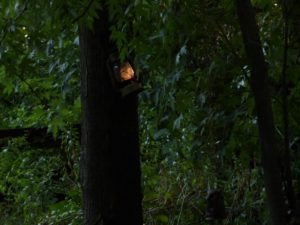
The ways are not separate
 Christ-consciousness is your will to know, to be, and to express. The time of Christ, and the second coming of Christ, are expressions meant to symbolize the completion of the cycle of birth, death, and rebirth as a means of coming to know. D:Day17.11
Christ-consciousness is your will to know, to be, and to express. The time of Christ, and the second coming of Christ, are expressions meant to symbolize the completion of the cycle of birth, death, and rebirth as a means of coming to know. D:Day17.11
Yesterday was the 15th anniversary of A Course of Love’s completion—the day I finished The Dialogues.
I could never forget this date or that of the Course’s beginning (December 1, 1998). Because the course was completed exactly one year later, it’s ending (December 1, 1999) is memorable as well. The Treatises are another story. Unless (or until) I find my old journals I will not know the beginning date. I do know that there was a pause in between the Course and the Treatises, and that the first treatise, “A Treatise on the Art of Thought,” didn’t start until after the New Year, making the treatises a baby of the year 2000. I also remember that as the last of the treatises, “A Treatise on the New” was complete, “The Dialogues” began immediately.
Memory is such a funny thing. Elusive and vivid.
Yet Jesus speaks often of a larger memory and the return of true remembrance, saying memory can deceive our eyes but not our hearts. (C:8.28) In the same way the days of our lives become the “times” of our lives and our growth beyond deception. We move out of the “time” of childhood to the time of adulthood, out of the “time” of the 1900’s into the “time” of the 2000’s. We move from the time of the Holy Spirit, to the time of Christ, and on to the beginning of the Way of Mary:
can deceive our eyes but not our hearts. (C:8.28) In the same way the days of our lives become the “times” of our lives and our growth beyond deception. We move out of the “time” of childhood to the time of adulthood, out of the “time” of the 1900’s into the “time” of the 2000’s. We move from the time of the Holy Spirit, to the time of Christ, and on to the beginning of the Way of Mary:
What Jesus represented or demonstrated has now been realized, which is why this is called the time of Christ. The “time” of Christ, whom so many associate with Jesus Christ, represents the “time” of fulfillment of the way of Jesus. What could be taught and learned has been taught and learned. Now it is time to move beyond what could be taught and learned to what can only be realized through relationship.
Thus we enter the ending stage of what can be realized through fulfillment of the way of Jesus and the beginning of the fulfillment of the way of Mary. This ending stage of the fulfillment of the way of Jesus is the stage of interaction with the world, the time of miracles, the death of the old way and the birth of the new. D:Day17.12-13
How comforting to know that this time moves fluidly into fulfillment of the way of Mary.
You have been preparing for this final stage of the fulfillment of the way of Jesus. You have also been preparing for the beginning of the fulfillment of the way of Mary. Many of you will follow the way of Jesus to completion, beginning a stage of interaction with the world, an interaction with the miracles that will aide in the dismantling of the old and with preparing the way for the birth of the new. Others of you will follow your hearts to a bypassing of the final stage of the old and to anchoring the new within the web of reality. Still others will participate in both, following their innate desire to facilitate the creation of change through a specific function even while moving into the new as they do so. Each way is as needed now as it was two thousand years ago. D:Day18.1
But the message is bigger than “ways” or “movements.” Like so much in this Course there is a both/and component, a unity of ways:
One way is active. One way is receptive. Yet the ways are not separate any more than Jesus was separate from Mary—or any mother separate from her child. The ways are rather complementary and symbiotic. Together they return wholeness and will bring about the completion of the time of Christ. D:Day18.2
The ways are not separate.
On the day after ACOL was complete, my husband got the call that alerted us that the woods behind our yard were for sale as tax-forfeited property (or for a price we could afford). I didn’t have a completed cabin for several years, but the “coming” of the new time still began that day, in 2001, as if an announcement was made: “A Course of Love is done. This is what’s next.” One life is over, another is beginning. And yet … the lives, the times, and the ways are not separate.
This is meaningful to me as I continue my visits with Course of Love reader/receivers, even as I prepare for a quiet spring that returns me to the cabin and my contemplative life—with the realization that these lives are not/will not be . . . separate. Each of us can embrace these complementary and symbiotic states . . . in our ways.
Sedona: Next weekend: Unity of Sedona ACOL Event
When: Saturday, October 15, 2016 – 10 AM to 4 PM.
Where: Unity of Sedona, 65 Deer Trail Dr., Sedona, AZ 86336
To register: http://goo.gl/Rh5q5P
Philadelphia: February, 2017 (more info soon).
Contemplative time: March and beyond



